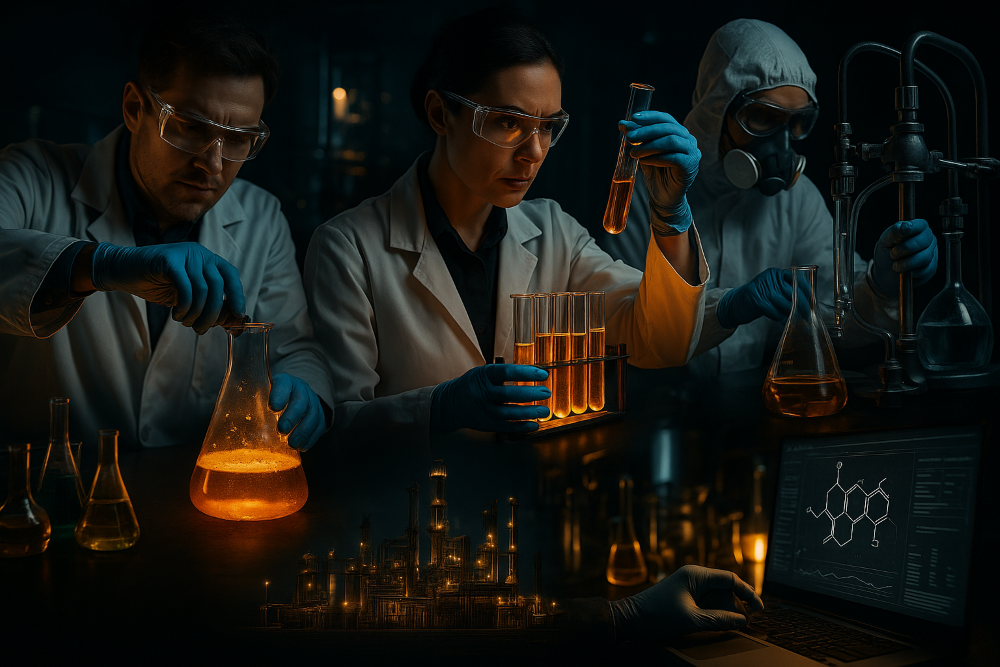The chemical sector represents one of the most essential pillars of the contemporary industrial world. It extends from the production of basic chemicals that serve as the cornerstone for countless industrial processes to the development of highly specialized chemical products that are indispensable in the pharmaceutical, electronics, and food industries. The role of the chemical industry surpasses mere production; it functions as a catalyst for innovation, technological advancement, and economic development. Every transformation in production processes, from traditional synthesis to advanced biochemical and nanotechnological applications, has far-reaching consequences for how other sectors operate. Chemical raw materials form the basis for the production of plastics, synthetic fibers, fertilizers, pharmaceuticals, and numerous specialized materials, making the industry an indispensable link in the chain of production, distribution, and consumption on a global scale.
The complexity and scope of the chemical sector are unparalleled within the industrial context. It is not merely about the manufacture of substances but about the systematic control of processes that combine chemical reactions, material transformations, and energy management on a scale ranging from kilograms to thousands of tons per year. The sector faces a unique combination of scientific, technological, economic, and societal challenges. On one hand, the need to minimize environmental impact, maximize energy efficiency, and implement circular principles is increasingly pressing. On the other hand, the sector must continuously respond to global market fluctuations, geopolitical influences, trade restrictions, and the rising demand for innovative, specialized, and sustainable products. This demands an exceptionally high level of expertise, strategic insight, and scientific innovation.
Structure and Activities
The chemical industry can be categorized into several subsegments, each with its own functional and economic dynamics. Basic chemicals, or bulk chemicals, form the core of the production of large volumes of chemical substances that serve as raw materials for nearly all industrial supply chains. These basic chemicals include acids, bases, salts, and inorganic compounds, which in turn provide the building blocks for plastics, synthetic fibers, fertilizers, and a wide array of industrial applications. Production processes in basic chemistry are both technologically intensive and capital-intensive, with large-scale chemical reactors, complex separation processes, and advanced safety protocols forming an integral part of operational infrastructure.
Fine chemicals focus on producing smaller quantities of highly specialized chemicals with greater added value, such as pharmaceutical compounds, agrochemicals, and substances for fragrances and colorants. In this sector, precision is paramount; it requires advanced analytical methods, meticulous quality control, and profound mastery of chemical synthesis and purification processes. Fine chemicals are often developed to meet specific application requirements, where scientific innovation and technological breakthroughs directly affect the effectiveness and safety of end products. The fine chemical industry is thus an indispensable link in healthcare, food production, and high-tech material manufacturing.
Specialty chemicals represent a segment focused on functionality and performance tailored to specific needs. This category includes chemicals for coatings, adhesives, cleaning products, and advanced materials such as composites and nanomaterials. Specialty chemicals enhance the properties of end products, such as durability, corrosion resistance, or electrical conductivity, and are applied across diverse sectors, from the automotive and electronics industries to food processing and healthcare. Developing these products requires in-depth knowledge of materials science, chemical reactions, and market needs, where innovation and differentiation drive competitive advantage.
Innovations and Technologies
Innovation is the beating heart of the chemical sector. Advanced technologies such as catalysis, process optimization, and chemical engineering enable producers to increase efficiency, reduce energy consumption, and minimize the environmental impact of chemical processes. Catalysis accelerates reactions, reduces the use of raw materials and energy, and allows for the industrial-scale synthesis of complex molecules that would otherwise be economically unfeasible. The development of new technologies spans improved reactor designs, advanced separation methods, and real-time process monitoring, making chemical production safer, more reliable, and more consistent.
Green chemistry constitutes a critical component of contemporary chemical innovation. This approach focuses on minimizing the use of hazardous substances, reducing waste streams, and maximizing energy efficiency. Companies implement processes that not only comply with environmental regulations but also actively contribute to the transition to a circular economy. Achieving this requires a multidisciplinary approach, where chemists, engineers, and environmental specialists collaborate to develop products that are safe, sustainable, and economically viable. Green chemistry further drives the development of alternative raw materials, bio-based products, and renewable production techniques.
Digitalization and Industry 4.0 are also transforming chemical manufacturing. Smart sensors, advanced process control systems, and big data analysis allow producers to monitor, optimize, and predict processes in real time. This increases operational efficiency, reduces production errors, and ensures consistent quality. Additionally, digital transformation enables faster responses to market shifts, adjustment of production volumes, and acceleration of innovation in product development. These technological advances integrate science, engineering, and data analysis into a coherent system that significantly strengthens the sector’s competitiveness.
Market Trends and Economic Impact
The chemical sector is deeply intertwined with global economic and geopolitical dynamics. A key trend is the shift toward sustainable production processes, driven by stricter regulations and societal pressure. Investments in environmentally friendly technologies, energy-efficient processes, and circular production principles are no longer optional but necessary to remain competitive and avoid sanctions or reputational damage. Sustainability has thus become a strategic element, where innovation, product development, and operational decisions are tightly interlinked.
Globalization also impacts the chemical industry on multiple levels. The integration of emerging markets, international trade flows, and evolving regulations requires a flexible and adaptive supply chain strategy. Raw material price volatility, currency fluctuations, and geopolitical tensions can have immediate consequences for the availability and cost of chemical products. This complex context necessitates thorough market analysis, risk assessment, and strategic decision-making, where chemical companies continuously evaluate production capacity, logistics networks, and investment portfolios.
The rising demand for personalized and specialized products further stimulates innovation and research and development investments. Chemical companies develop tailor-made solutions that meet specific industrial or consumer requirements. This trend directly affects product development, process design, and commercial strategies, with differentiation and unique product characteristics playing a crucial role in maintaining competitive advantage. Innovative chemicals and advanced materials thus respond to the growing complexity and diversity of the market, where science, technology, and market insight converge.
Safety and Regulation
Safety and regulation form the foundation upon which the chemical sector operates. The production, storage, and transport of potentially hazardous substances require an unparalleled level of risk management, process protection, and oversight. Chemical companies must comply with a complex set of national and international regulations, spanning environmental, chemical safety, labor, and product standards. This includes the European REACH regulation, U.S. OSHA standards, and numerous regional guidelines, each demanding strict adherence to minimize legal and operational risks.
Implementing safety measures goes beyond legal compliance; it involves a systematic approach to risk management, safety analysis, emergency procedures, and continuous staff training. Every stage of the production process, from chemical synthesis to packaging and transportation, must be meticulously monitored and controlled. Incidents can result not only in financial losses but also in severe damage to the environment and corporate reputation. Therefore, a culture of safety, where knowledge sharing, protocols, and monitoring are central, is indispensable for sector continuity and legitimacy.
Regulations are continuously evolving, requiring chemical companies to adopt a proactive and anticipatory stance. New legislation, amendments to existing standards, or international agreements can directly affect product development, operational processes, and market access. The ability to respond rapidly to regulatory changes, assess their impact, and adjust business operations accordingly is crucial for ensuring compliance, continuity, and competitiveness.
Future Developments
The future of the chemical sector will be defined by continuous innovation, digitalization, and sustainability. Green chemistry will further evolve, with alternative raw materials, bio-based products, and energy-efficient production methods playing a central role. Chemical companies will invest in technologies that not only comply with environmental standards but actively contribute to a circular economy. Achieving this requires an integrated approach, where chemical knowledge, engineering, and environmental expertise converge to create solutions that are economically, ecologically, and technologically feasible.
Technological advancements such as artificial intelligence, automation, and digital transformation will profoundly reshape production, process optimization, and product development. Smart factories, advanced data analysis, and real-time monitoring will reduce production costs, enhance efficiency, and increase flexibility. As a result, the sector will be able to respond more swiftly to market demands, adjust production volumes, and accelerate innovation in products, while ensuring safety, quality, and sustainability.
The expansion of specialized markets and personalized products will further drive strategic focus on research, development, and innovation. Chemical companies will develop solutions that meet the specific requirements of diverse industries, from high-tech and pharmaceutical sectors to food and environmental applications. The combination of scientific expertise, technological innovation, and market insight will position the chemical sector as an essential and forward-looking industry, supporting both economic growth and societal advancement.
The chemical industry thus remains an indispensable engine of innovation, economic development, and technological progress. Through continuous investment in technology, sustainability, safety, and R&D, the sector will adapt to changing market conditions, overcome emerging challenges, and maintain its critical role in supporting numerous other industries while advancing modern society.
Financial and Economic Crime
The chemical sector occupies a pivotal role in the global economy, encompassing an intricate spectrum of activities ranging from the production of basic chemicals and specialty substances to the manufacture of pharmaceutical products, agrochemicals, and advanced materials. Its significance extends far beyond mere production; the sector underpins countless processes and products that fuel modern industry, consumer markets, and technological advancement. Characterized by a highly complex value chain that spans all stages of production, distribution, and consumption, the chemical industry is exposed to vast financial flows and operates on an international scale. This combination renders it particularly susceptible to diverse forms of financial and economic crime, which can undermine operational integrity, compromise safety, and erode public trust. The challenges presented in this domain are multifaceted and demand meticulous, strategic, and comprehensive measures to safeguard the sector’s credibility and continuity.
The globalized nature of chemical production and trade, combined with the high economic stakes of specialized products and raw materials, means that companies within this sector must maintain a constant state of vigilance. Any lapse in oversight can result in significant financial losses, regulatory sanctions, or reputational damage that reverberates across global supply chains. Financial and economic crimes are not abstract risks; they have tangible consequences for operational sustainability, compliance obligations, and stakeholder confidence. As such, companies are compelled to develop and implement rigorous controls, proactive monitoring systems, and advanced analytical methodologies to detect, prevent, and respond effectively to illicit activities.
1. Fraud in Contracts and Deliveries
Contracts and delivery agreements form the backbone of chemical operations, governing the sourcing of raw materials, the sale of finished products, and the orchestration of complex distribution networks. Fraud in these agreements represents a profound threat, ranging from the submission of false invoices, deliberate misrepresentation of contractual terms, to misleading practices in the delivery of raw materials or finished goods. The ramifications of such fraudulent conduct extend far beyond immediate financial losses.
For example, suppliers might deliver counterfeit, substandard, or tampered chemicals, potentially compromising the safety, quality, and efficacy of final products. Such misconduct can trigger product recalls, costly damage claims, regulatory scrutiny, and irreversible harm to corporate reputation. The gravity of these consequences underscores the necessity for companies to establish stringent compliance protocols. Comprehensive supplier verifications, transparent procurement procedures, and regular audits of contractual adherence form the foundation of an effective defense against fraud.
A proactive approach to fraud prevention demands a sophisticated integration of operational oversight, legal safeguards, and technological tools. Companies must not only detect and respond to fraudulent behavior but also anticipate potential vulnerabilities within contracts and supply chains. Embedding these practices within corporate governance frameworks ensures resilience against both opportunistic and systematic fraud, securing financial, operational, and reputational integrity.
2. Money Laundering Through Chemical Trade and Production
The chemical sector is inherently susceptible to money laundering due to the complexity of production processes, international distribution networks, and the substantial financial transactions they entail. Criminal entities may exploit these characteristics to obscure illicit funds, manipulating the valuation of goods, engaging in convoluted intercompany transactions, or utilizing offshore structures and tax havens to mask illegal income streams.
For instance, companies might engage in financial transfers that bear little correlation to the actual value of delivered products, effectively enabling the concealment of unlawfully obtained funds. The implications of such practices are severe, potentially compromising corporate compliance, regulatory standing, and broader market integrity. To combat this, the chemical industry must implement robust anti-money laundering frameworks encompassing comprehensive customer due diligence, continuous transaction monitoring, and the timely reporting of suspicious activities to competent authorities.
Advanced analytical tools, artificial intelligence, and predictive algorithms provide a significant advantage in detecting anomalous financial patterns and mitigating money laundering risks. By integrating these technologies within operational and compliance structures, companies can enhance transparency, reduce exposure to criminal exploitation, and safeguard both their own interests and the broader integrity of the chemical market.
3. Corruption and Bribery in Regulation and Permits
The chemical sector is subject to stringent national and international regulatory frameworks covering environmental compliance, safety standards, product quality, and production protocols. In such an environment, corruption and bribery can manifest in the pursuit of permits, regulatory compliance, or the manipulation of inspections and audits.
Corruption may occur, for example, when companies offer bribes to regulatory officials to secure approvals, avoid penalties, or expedite bureaucratic procedures. The consequences are manifold, potentially endangering safety, the environment, and undermining fair competition. Combating corruption requires the establishment of robust ethical guidelines, transparent internal controls, and an unwavering commitment to legal compliance. Regular audits, adherence to anti-corruption legislation, and fostering a corporate culture of integrity are indispensable in preventing unethical conduct.
A preventative approach to corruption must be proactive and systematic. By embedding ethical standards into every operational layer, from procurement to executive decision-making, companies create a resilient structure that deters illicit influence. This culture of accountability not only protects legal standing but also enhances stakeholder confidence and preserves reputational capital in an industry where trust is paramount.
4. Cybercrime and Digital Security in Chemical Production
The digitization of chemical production, encompassing automated processes and online platforms for distribution and commerce, has created novel vulnerabilities to cybercrime. Threat actors may seek to acquire sensitive intellectual property, including proprietary formulas, production methodologies, and strategic business information.
A successful cyberattack can yield significant financial losses, operational disruption, reputational damage, and even physical hazards if production processes are compromised. The stakes are heightened by the critical nature of chemical products and the complex integration of industrial systems. Consequently, comprehensive cybersecurity measures are essential, including state-of-the-art firewalls, encryption protocols, continuous system monitoring, and real-time threat detection.
Developing an integrated incident response plan, coupled with continuous employee cybersecurity training, is critical in mitigating the impact of digital attacks. Companies must adopt a proactive stance, combining technical defenses with procedural readiness, to ensure that sensitive information, operational integrity, and safety are maintained in an increasingly digital industrial landscape.
5. Internal Fraud and Unethical Behavior within Chemical Companies
Internal misconduct poses another significant risk in the chemical sector. Employees with access to financial resources, production processes, or strategic information may engage in fraudulent activities, including the misappropriation of raw materials, manipulation of production costs, or exploitation of internal systems for personal gain.
Mitigating internal fraud requires a multifaceted approach encompassing stringent internal controls, well-defined ethical policies, and the cultivation of an organizational culture centered on integrity and transparency. Regular audits, access restrictions to critical information, and channels for reporting suspicious conduct are essential components of a proactive fraud prevention strategy.
Additionally, implementing comprehensive compliance programs, promoting ethical awareness, and reinforcing accountability at all levels fortify a company’s defenses against internal malfeasance. By addressing these risks systematically, organizations ensure operational continuity, financial security, and the preservation of corporate credibility in a sector where trust, safety, and regulatory compliance are paramount.
Privacy, Data, and Cybersecurity
The chemical sector, encompassing the production, processing, and distribution of chemicals and related products, occupies a position of extraordinary strategic importance in the global economy. This sector spans an expansive range of activities, from the manufacturing of basic chemicals and petrochemical products to highly specialized chemicals used across industries such as agriculture, pharmaceuticals, and consumer goods. Despite its central role in underpinning industrial and technological development, the chemical sector is confronted with formidable challenges in the realms of privacy, data protection, and cybersecurity. These challenges demand a meticulous, structured, and legally-informed approach to ensure that companies can safeguard sensitive information, maintain operational integrity, and comply with a complex web of regulatory requirements.
In an industry where innovation, intellectual property, and operational efficiency define competitive advantage, the protection of data and digital assets is not merely a technical matter but a critical business imperative. Cybersecurity failures, data breaches, or unauthorized access can have far-reaching consequences, including financial loss, reputational damage, regulatory penalties, and even safety risks. The sector must therefore adopt an integrated approach to privacy and data security, combining advanced technical measures, internal policies, employee awareness, and compliance with international standards. Only through such a comprehensive strategy can the integrity of the sector, the continuity of operations, and the protection of intellectual property be reliably ensured.
1. Securing Critical Business Data and Intellectual Property
The chemical sector manages vast quantities of highly sensitive information, including product formulations, manufacturing protocols, R&D data, and proprietary customer information. This data is often the lifeblood of a company, forming the core of intellectual property and providing a competitive advantage in a fiercely contested global market. Protecting these assets from unauthorized access, loss, or exploitation is therefore paramount.
A concrete example is the safeguarding of data related to novel chemical formulations and advanced production processes. Cybercriminals may attempt to infiltrate networks using phishing attacks, malware, or sophisticated hacking techniques to acquire commercially valuable information. To counteract these risks, companies must employ a combination of data encryption, secure access protocols, continuous network monitoring, and internal controls that strictly limit access to confidential information.
Beyond technical safeguards, companies must cultivate an organizational culture of vigilance and responsibility, ensuring that employees understand the critical importance of maintaining confidentiality. Security protocols must be embedded into daily operations, with ongoing audits and testing to verify adherence and identify potential vulnerabilities before they can be exploited.
2. Compliance with Regulations and Industry Standards
The chemical sector operates under a dense regulatory framework designed to protect human health, the environment, and product integrity. These regulations include international statutes such as the European REACH regulation and the United States Toxic Substances Control Act (TSCA), as well as industry standards including ISO 27001 for information security and ISO 9001 for quality management.
A clear illustration of compliance complexity lies in meeting REACH requirements, which mandate detailed registration and reporting on chemical safety, composition, toxicity, and environmental impact. Companies must ensure the integrity, accuracy, and confidentiality of such data, safeguarding it against unauthorized access while ensuring that all reporting obligations are meticulously fulfilled. Non-compliance can result in substantial fines, legal liability, and reputational harm.
Compliance is not simply a legal obligation but a strategic necessity that demands robust internal procedures, comprehensive training programs, and regular internal audits. Organizations must adopt an approach that integrates regulatory awareness, operational rigor, and digital safeguards to maintain both legal compliance and market credibility.
3. Securing Production and Process Automation
Advanced automation technologies, including industrial control systems (ICS) and SCADA platforms, are increasingly central to chemical production. These systems enable precise monitoring and control of complex processes but simultaneously create potential vulnerabilities to cyberattacks, which could disrupt operations, compromise safety, or result in production losses.
For instance, a cyberattack on a SCADA system controlling chemical synthesis could manipulate process parameters, potentially causing equipment damage, production errors, or hazardous conditions. To mitigate these risks, companies must implement rigorous cybersecurity protocols, including network segmentation, secure system configurations, and regular security testing. Additionally, comprehensive incident response plans and crisis management procedures are essential to minimize impact should a breach occur.
Proactive risk assessment and continuous improvement of cybersecurity measures are critical. This involves not only technology but also governance, training, and accountability structures to ensure that the sector’s automation infrastructure remains secure, resilient, and reliable.
4. Protecting Data in Research and Development Environments
R&D activities are at the heart of the chemical sector’s competitive edge. Research generates sensitive experimental data, proprietary formulas, and development plans, all of which must be rigorously protected to preserve intellectual property and maintain scientific integrity.
A tangible example is the safeguarding of data stored in laboratory information management systems (LIMS) or other specialized R&D platforms. Unauthorized access, data manipulation, or loss could severely compromise ongoing research and innovation. Companies must implement comprehensive security measures such as encryption, controlled access, and regular backups to protect these assets.
Equally important is fostering a culture of security within R&D teams, ensuring that researchers and laboratory personnel are trained in cybersecurity best practices. This human factor is as vital as technological measures in preventing breaches and maintaining the confidentiality and integrity of research outputs.
5. Protecting Data in Supplier and Customer Relationships
Chemical companies operate within complex networks of suppliers, distributors, and clients, requiring the exchange of sensitive information including product specifications, contracts, and transactional data. Protecting this information is essential to maintain confidentiality, prevent fraud, and secure business continuity.
An example of this challenge is the use of electronic data interchange (EDI) systems for sharing critical information with partners. Without robust security protocols, these channels are vulnerable to unauthorized access, data breaches, and fraudulent manipulation. Companies must implement secure communication technologies, enforce strict access controls, and conduct regular audits to ensure compliance with security requirements across the network.
Maintaining vigilance in supplier and customer interactions extends beyond technical measures. It requires contractual safeguards, accountability mechanisms, and continuous monitoring to ensure that all parties adhere to agreed security standards, protecting the integrity of shared information throughout the commercial ecosystem.
6. Securing Data in Supply Chain and Logistics
The chemical sector’s complex supply chain involves suppliers, carriers, and distribution centers, creating a significant volume of sensitive information that must be protected. Cyberattacks on logistics systems could disrupt deliveries, cause production delays, or result in the loss or misappropriation of shipments.
A concrete example involves attacks on logistics management platforms used to track and coordinate chemical deliveries. To mitigate such risks, companies must deploy network security measures, enforce secure access controls, and continuously monitor supply chain systems for suspicious activity. Crisis management and recovery strategies are essential for rapid response to incidents and for minimizing operational impact.
Effective supply chain security integrates both technical measures and procedural oversight, ensuring continuity of operations, the integrity of data, and the timely delivery of products within a secure, resilient framework.
7. Employee Training and Awareness
Employees represent both the first line of defense and a potential vulnerability in the protection of data and systems. Human error or lack of awareness can create openings for cyberattacks, data breaches, or other security incidents.
For example, phishing attacks targeting employees can compromise credentials or sensitive information. Regular training programs, awareness campaigns, and clear communication of security policies are crucial in equipping employees to recognize and respond to threats. Promoting a culture of cybersecurity awareness ensures that staff members understand the consequences of lapses and actively participate in safeguarding company assets.
Ultimately, employee education, combined with robust technical safeguards and structured compliance frameworks, forms a comprehensive defense against data security risks. In the chemical sector, where intellectual property, operational continuity, and regulatory compliance are inextricably linked, this integrated approach is essential to maintaining competitive advantage, legal integrity, and organizational resilience.














